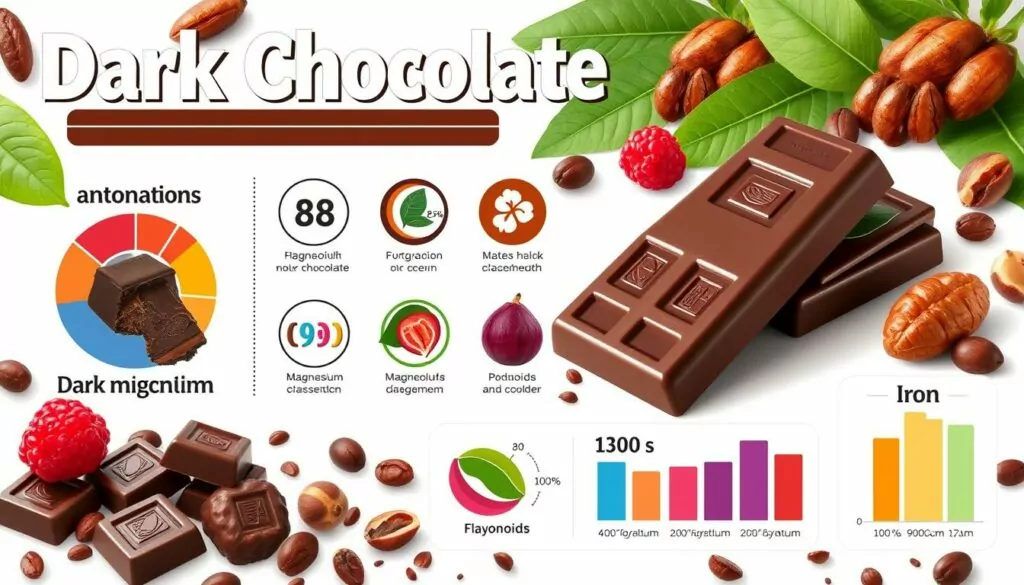Dark chocolate isn’t just tasty; it’s a superfood in disguise. This article explores the science-backed health benefits of this beloved treat. Discover how dark chocolate can boost your well-being in surprising ways.
Key Takeaways
- Dark chocolate is packed with essential nutrients and antioxidants that can boost your overall health.
- Consuming dark chocolate can improve cardiovascular function by enhancing blood flow and lowering blood pressure.
- The flavanols in dark chocolate have been shown to enhance cognitive function and brain health.
- Moderation is key when it comes to dark chocolate consumption for weight management.
- Choosing high-quality dark chocolate with a higher cocoa percentage is essential to reap the maximum health benefits.
Dark chocolate can positively impact your health in many ways. It benefits heart health, brain function, and more. Let’s explore how this delicious treat can contribute to a healthier you.
What is Dark Chocolate?

Dark chocolate is a rich, intense chocolate with many health benefits. It has more cocoa solids and less sugar than milk or white chocolate.
Defining Dark Chocolate
Dark chocolate must contain at least 35% cocoa solids. Higher cocoa percentages create a more intense, bitter flavor. Its complex taste can be fruity, floral, nutty, or earthy.
Cocoa Percentage and Flavors
Cocoa percentage greatly affects dark chocolate’s flavor profile. Chocolates with 70% to 90% cocoa have a strong, bittersweet taste. They often taste like coffee, spices, or have a hint of bitterness.
Dark chocolates with 50% to 70% cocoa are smoother and more balanced. They have more sweetness and a wider range of flavor notes.
| Cocoa Percentage | Flavor Profile |
|---|---|
| 50% – 70% | Smooth, balanced, sweet with various flavor notes |
| 70% – 90% | Intense, bittersweet, with notes of coffee, spices, and bitterness |
Knowing dark chocolate basics helps you explore its health benefits. These include its definition and how cocoa percentage affects flavor.
Dark Chocolate Nutrient Profile

Dark chocolate is more than a tasty treat. It’s packed with essential vitamins, minerals, and antioxidants. These nutrients can offer various health benefits.
Antioxidants, especially cocoa flavanols, are key nutrients in dark chocolate. These plant compounds fight harmful free radicals. Dark chocolate has more cocoa flavanols than other chocolates.
| Nutrient | Amount per 100g of Dark Chocolate |
|---|---|
| Calories | 546 |
| Total Fat | 30.9g |
| Saturated Fat | 18.4g |
| Carbohydrates | 46.4g |
| Fiber | 10.9g |
| Protein | 7.8g |
| Iron | 7.6mg |
| Magnesium | 228mg |
| Copper | 1.7mg |
| Manganese | 1.5mg |
Dark chocolate is rich in vitamins and minerals. It contains iron, magnesium, copper, and manganese. These nutrients support bone health and energy production.
Knowing dark chocolate’s nutrient profile helps you make better food choices. You can enjoy this treat while reaping its health benefits.
“Dark chocolate is a treasure trove of beneficial nutrients, making it a guilt-free indulgence when consumed in moderation.”
Antioxidants in Dark Chocolate

Dark chocolate is packed with antioxidants, especially cocoa flavanols. These compounds fight free radicals and reduce oxidative stress. They promote overall health and well-being in many ways.
Cocoa Flavanols and Their Benefits
Cocoa flavanols are the main antioxidants in dark chocolate. They come from cocoa beans and are a type of flavonoid. These compounds fight free radicals, which can damage cells.
Dark chocolate rich in cocoa flavanols offers many health benefits. It can improve blood flow and heart health. It may also boost brain function and reduce inflammation.
- Improved blood flow and cardiovascular health
- Enhanced cognitive function and brain health
- Reduced inflammation and oxidative stress
- Potential protection against certain types of cancer
Fighting Free Radicals
Cocoa flavanols in dark chocolate effectively neutralize free radicals. These unstable molecules can harm cells and cause inflammation. They may also speed up aging and increase disease risk.
Eating dark chocolate regularly gives your body powerful antioxidants. These can help fight the harmful effects of free radicals. This promotes better overall health and well-being.
“Dark chocolate is a powerhouse of antioxidants, and the cocoa flavanols it contains are particularly effective at neutralizing free radicals and reducing oxidative stress.”
Dark Chocolate Health Benefits: A Science-Based Analysis

Dark chocolate offers more than just a rich flavor. It has several science-backed health benefits worth exploring. Let’s dive into how this treat can boost your well-being.
Dark chocolate is packed with antioxidants called cocoa flavanols. These compounds fight free radicals and reduce oxidative stress in the body. This can improve heart health and brain function.
Studies show dark chocolate can enhance blood flow and lower blood pressure. These factors are crucial for a healthy heart. The magnesium and fiber in dark chocolate may also support weight management.
“Dark chocolate is a rich source of flavanols, which have been linked to a variety of health benefits, including improved cardiovascular and cognitive function.” – Dr. Sarah Westwood, Nutritionist
Adding high-quality dark chocolate to your diet can offer many health perks. However, remember to enjoy it in moderation. Balance is key when reaping the science-based advantages of dark chocolate.
Cardiovascular Health Benefits

Dark chocolate offers impressive benefits for heart health. Its antioxidants improve blood flow and lower blood pressure. This reduces the risk of heart disease.
Improving Blood Flow
Dark chocolate contains flavanols, which boost nitric oxide production. Nitric oxide helps blood vessels expand and relax. This improves blood flow throughout the body.
Better blood flow means improved oxygen and nutrient delivery. It also reduces strain on the cardiovascular system.
Lowering Blood Pressure
Regular dark chocolate consumption can help lower blood pressure. Flavanols inhibit the angiotensin-converting enzyme (ACE), which constricts blood vessels. By blocking ACE, dark chocolate keeps blood vessels relaxed and open.
Dark chocolate’s heart benefits are significant. It helps reduce the risk of heart disease, a leading cause of death. Enjoy dark chocolate as part of a balanced diet for better heart health.
Cognitive Function Benefits

Dark chocolate boosts brain health and cognitive function. It improves memory, focus, and overall brain performance. Scientific evidence supports these positive impacts.
Cocoa flavanols in dark chocolate are the key. These antioxidants enhance brain blood flow and oxygenation. This leads to better cognitive abilities.
- Studies show dark chocolate enhances short-term memory and recall. It also improves reaction time and problem-solving skills.
- The flavanols may protect against age-related cognitive decline. This could lower the risk of neurodegenerative diseases like Alzheimer’s.
- Regularly enjoying moderate amounts of dark chocolate can boost brain health.
Add dark chocolate to your diet for a tasty brain boost. Enjoy its cognitive benefits and support your overall brain function.
“Eat chocolate, improve your brain – that’s the message from a growing body of research on the cognitive benefits of dark chocolate.”
Dark Chocolate and Weight Management

Dark chocolate is a nutritious treat, but moderation is crucial. It’s part of a balanced diet. The link between dark chocolate and weight management needs a careful approach.
Moderation is Key
Dark chocolate can help with weight management when eaten in the right amounts. It’s packed with health benefits but also high in calories. Too much can lead to weight gain.
Enjoy small portions of dark chocolate, about 1-2 ounces (30-60 grams). Savor it slowly to fully taste the rich flavors. Add it as a treat to your balanced diet.
- Stick to small, single-serving portions of dark chocolate, typically around 1-2 ounces (30-60 grams).
- Savor the chocolate slowly, allowing yourself to fully experience the rich, intense flavors.
- Incorporate dark chocolate as a treat within your overall balanced diet, not as a replacement for other essential food groups.
Eat dark chocolate with care and thought. This way, you can enjoy its benefits without hurting your health goals.
“The key to enjoying dark chocolate for weight management is to consume it in small, controlled portions as part of a balanced, calorie-conscious diet.”
Choosing the Right Dark Chocolate

Not all dark chocolate bars offer equal benefits. Understanding cocoa percentage and quality is crucial. Learn to read labels to identify top-notch dark chocolate and maximize its nutrients.
Cocoa Percentage and Quality
Cocoa percentage is a key quality indicator. Higher percentages mean more antioxidants and nutrients. For maximum health benefits, choose dark chocolate with at least 70% cocoa.
Cocoa bean sourcing and processing also affect quality and flavor. Look for chocolate made from responsibly-sourced, ethically-grown beans. Minimal processing helps preserve the cocoa’s natural goodness.
- Opt for dark chocolate with a cocoa percentage of 70% or higher
- Choose dark chocolate made from ethically-sourced, minimally processed cocoa beans
- Avoid dark chocolate with a long list of additives or preservatives
Keep these tips in mind when selecting dark chocolate. You’ll enjoy its rich flavor and maximize its health benefits.
Potential Downsides of Dark Chocolate

Dark chocolate offers many health benefits. However, it’s important to know its potential downsides and side effects. This knowledge helps you make smart choices about eating dark chocolate.
Allergic Reactions
Dark chocolate may trigger allergic reactions in some people. If you’re allergic to cocoa, milk, or other ingredients, avoid it. Talk to your doctor before eating dark chocolate if you have concerns.
Digestive Issues
Dark chocolate’s high fat and fiber can cause stomach problems. These include bloating, gas, or diarrhea. People with sensitive stomachs should limit their intake or choose low-fat options.
Caffeine and Stimulant Concerns
Dark chocolate contains caffeine and other stimulants. These can cause jitters, faster heartbeat, and sleep problems. Be aware of how much your body can handle.
Eat dark chocolate in moderation. This is especially important if you’re sensitive to stimulants.
Potential for Overconsumption
Dark chocolate is high in calories. Eating too much can lead to weight gain and other health issues. Enjoy it as part of a balanced diet.
Understanding the downsides of dark chocolate helps you make smart choices. Be aware of possible side effects. Enjoy this treat in moderation as part of a healthy lifestyle.
Conclusion
Scientific evidence strongly supports dark chocolate’s health benefits. It’s rich in antioxidants and positively impacts heart health and brain function. Dark chocolate can be a valuable addition to a balanced diet.
Understanding dark chocolate basics is key. Follow guidelines for portion control and quality selection. Savor this superfood in moderation, enjoying its rich flavors and potential health perks.
Dark chocolate can support your heart and boost brain power. It’s a guilt-free treat when consumed responsibly. Choose wisely and enjoy the dark chocolate health benefits in your daily life.
Explore the world of dark chocolate with knowledge. Reap the conclusion of its science-backed advantages. Remember, moderation is the secret to unlocking its full potential.
